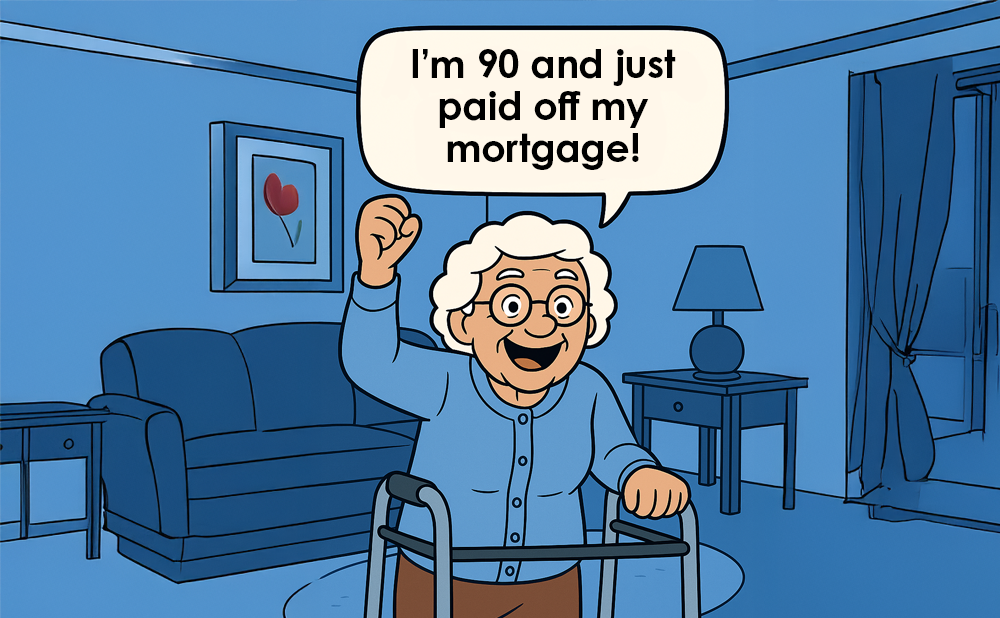
 Jayson Hardie – Managing Partner – (636) 256-5712
Jayson Hardie – Managing Partner – (636) 256-5712
Eye roll. Hands thrown up. Shoulders shrugged.
Those are just a few of the natural reactions to hearing talk about a 50-year mortgage.
(That was my reaction, by the way.)
Once you get past that initial response, the math doesn’t exactly make it better.
The average life expectancy in the U.S. is approximately 75 years, and not many people purchase their first home before the age of 25. In fact, these days, that age is rapidly rising.
So… are we really talking about a mortgage that lasts for the rest of your natural life?
Let’s take a closer look at the case for and against a potential 50-year mortgage.
The Case Against the 50-Year Mortgage
You’ll never pay it off.
And that’s not just being dramatic — it’s statistically true. With a 50-year term, you’re almost guaranteed not to pay off your home by making only the minimum payments.
The average American lives to around the age of 75, and the median age of a first-time homebuyer is roughly 40. That means our 40-year-old buyer would make their final mortgage payment at…age 90!
The total payback is exceptionally expensive.
This is also true. Let’s do a little math. Suppose you take out a $300,000 mortgage at a 6.5% interest rate. How does that compare with a 30-year amortization versus a 50-year amortization?
(Amortization simply means how long it takes to pay off your loan in full through regular monthly payments.)
Spoiler: it’s a big difference.
Let’s Look at the Numbers
| Loan Term | Monthly Payment |
Total Paid Over Life of Loan |
Total Interest Paid |
| 30-Year Amortization | $1,896.20 | $682,633 | $382,633 |
| 50-Year Amortization | $1,691.15 | $1,014,690 | $714,690 |
Yep, you read that right. You would pay back over $1 million on that 50-year mortgage, which is more than $300,000 higher than what you’d pay on a 30-year loan.
After that, it should be case closed… right? Not for everyone…here’s the flip side.
The Case For the 50-Year Mortgage
It makes the monthly payments more affordable on the home you want.
That part is true, yes. The reason homes are so expensive right now comes down to a simple case of supply and demand. And those forces aren’t likely to ease anytime soon.
By stretching the loan over 50 years, the monthly payment drops just enough to make the home you actually want attainable, rather than out of reach. For many buyers, it is the difference between settling for a starter house or buying a forever home.
You can always refinance later.
This is the “marry the house, date the rate” strategy. The idea is simple: focus on securing the home first, as the financing can be adjusted later. If interest rates come down, you can refinance into a 30-year term and improve your long-term outlook. That flexibility makes the 50-year mortgage a useful short-term tool rather than a lifelong sentence.
Investing the monthly savings could actually make you money.
Here’s where things get interesting. Using our earlier example, the 50-year mortgage saves a little over $200 each month compared to a 30-year loan. If you invested that extra $200 in an S&P 500 index fund and earned historical average returns, you could build more than $500,000 in wealth over time.
Of course, this approach takes discipline and a willingness to accept some risk. Market performance can fluctuate, and there’s no guarantee that future returns will match the past. Balancing today’s higher mortgage rates against the potential gains from long-term investing is a personal decision. For some, it’s a smart play that leverages time and compounding growth. For others, the uncertainty of the market may outweigh the potential rewards.
The Bottom Line
The 50-year mortgage, like any debt instrument, can be a tool or a trap. Used wisely, it could make homeownership more accessible. Used carelessly, it could stretch your finances and keep you paying for a lifetime.
Right now, the 50-year mortgage isn’t actually available — it’s still an idea being discussed as a potential offering in the housing market. But the larger conversation it sparks is valuable: how to balance the rate you take on a loan with what you could be doing with your extra money. That kind of financial strategy, weighing debt against opportunity, is always worth exploring.
At Homestead Financial Mortgage, we’re here to help you look at your options, understand the trade-offs, and find the mortgage plan that fits your goals best.